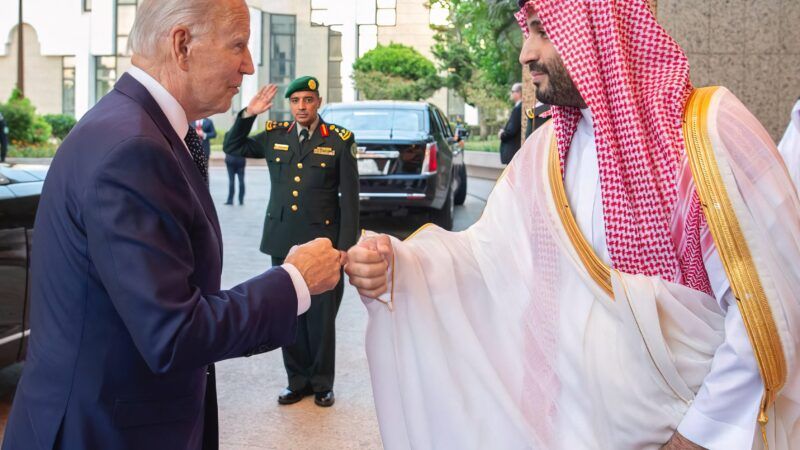Biden Wants a Defense Pact With Saudi Arabia While 9/11 Victims Are Suing the Kingdom
The White House announced a “near final” defense pact with Saudi Arabia yesterday, just as new evidence about Saudi links to 9/11 is emerging.

American troops might be pledged to defend Saudi territory soon. President Joe Biden is seeking a "mega-deal" that would bind the United States, Saudi Arabia, and Israel into a Middle Eastern military alliance. After Biden's National Security Adviser Jake Sullivan met with Saudi Crown Prince Mohammad bin Salman last week, both governments announced that they had a "near-final" version of a defense pact worked out.
A group of 9/11 victims' families wants something very different. For years, they have been suing the Saudi government, based on alleged contacts between Saudi officials and 9/11 hijackers. Earlier this month, the Saudi government argued that its officials had nothing to do with the attacks and motioned for the case to be thrown out. The families' lawyers responded with a bombshell filing: They claim to have new evidence that the 9/11 hijackers were assisted by "a covert and illegal Saudi government platform" on American soil.
The families' filing focuses on accused Saudi spy Omar Al Bayoumi, who hosted two of the future hijackers in southern California, and Saudi diplomat Fahad Al Thumairy, who allegedly sent an associate to help host them. The Saudi government argues that Bayoumi "had innocent motives: to help fellow Saudis who were new to the San Diego Muslim community and to get a referral fee from his apartment manager. Al Thumairy did not assist the hijackers at all."
But the families cited several new pieces of evidence that have not been revealed to the public yet—including FBI memos, home videos of Al Bayoumi, and phone surveillance records—that link Al Bayoumi and Al Thumairy to the hijackers. The families also have a "smoking gun" from British police, a notebook seized from Al Bayoumi that includes "a drawing of a plane, alongside a calculation used to discern the distance at which a target on the ground will be visible from a certain altitude."
Former U.S. counterterrorism official Steve Simon, who assisted the families with their case and who was my colleague when I worked at the Quincy Institute two years ago, believes that support for the hijackers did not necessarily come from the top.
Saudi government motives "won't be fully understood until the royal archives are opened, assuming that internal discussions were even recorded. But it does seem, in general, that the House of Saud ruled but did not govern; governance was typically for commoners," he wrote in The Atlantic. "Without inquiring closely into the day-to-day operations of the religious and foreign-affairs ministries, the royals could not have had a clear idea of what was being done in their name, including the deployment of Saudis with diplomatic visas for the purpose of attacking the kingdom's strongest, most reliable transactional partner."
And the kingdom has changed a lot under bin Salman, who crushed the old Saudi religious establishment during his rise to power and now runs a much tighter ship. Still, the Saudi government does not seem keen to have U.S. courts dig up its past activities, especially since a majority of the American public already opposes a defense pact.
Meanwhile, Saudi Arabia and Israel seem to have very different ideas of what Biden's mega-deal would mean for them. Last year, the Israeli side was quite optimistic. Israeli Strategic Affairs Minister Ron Dermer stated that a Saudi-Israeli deal would be a "reverse 9/11." But the war in Gaza has revived the Palestinian issue in Arab politics, and Saudi Arabia is now demanding Palestinian independence as a prerequisite to a deal with Israel.
This weekend, Israeli Prime Minister Benjamin Netanyahu implied that he would reject a Saudi deal because an independent Palestine "will inevitably be a terror state." At the same time, Saudi Arabia has been trying to do an end-run around Netanyahu, pushing for a "less-for-less model" that cuts Israel out of the pact. The Biden administration, however, believes that it can still get everyone on board.
"The integrated vision is a bilateral understanding between the United States and Saudi Arabia combined with normalization between Israel and Saudi Arabia, combined with meaningful steps on behalf of the Palestinian people," Sullivan, the Biden adviser, said earlier this month. "All of that has to come together…you can't disentangle one piece from the others."


Show Comments (49)